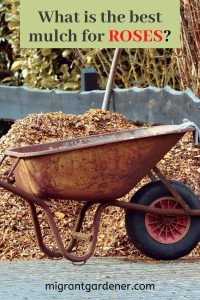What type of mulch is best for roses?
Mulch – what exactly is it?
Mulch is a general term. The word ‘mulch’ applies to any material that is spread over a soil’s surface. In this case, it would be on the soil surface around the base of your roses.
Why bother with mulch?
Well, mulch helps to insulate the root system of any plant, including roses.
Mulch also helps in retaining water within the soil.
Mulch helps to prevent weed growth.
Mulch likewise helps to regulate soil temperature.
So that’s why we should use mulch in our gardens as a general rule.
But here’s the thing. There are very many different types of mulches available. What’s the best mulch for roses?
Let’s find out now.

Organic Rose Mulch
Mulches are mostly available in organic form. Organic means that the mulch will decompose. This is a good thing in one way as it provides the soil, and also the roses, with minerals. The not-so-good thing is that it means that your rose mulch will need to be replaced relatively soon and relatively often.
In order to decompose, organic mulches draw in nitrogen. What this means is that it can deplete the soil of much-needed nitrogen content. All plants require nitrogen, particularly for healthy foliage growth.
Anyway, to counteract this nitrogen depletion from the soil it’s good policy to incorporate garden compost into your soil before you introduce an organic mulch.
Apply a minimum of 2 inches of compost to your soil. Then add the mulch over the top. There’s no actual requirement to labor hard in terms of digging the compost into the soil. The compost will be taken down into the soil through microbial activity.
Mulch for roses can be in the form of straw, chipped or shredded bark, or grass clippings. You can even use newspaper as a mulch.
The most attractive of these in terms of aesthetics is chipped or shredded bark. Pine needles work fine as well. As do grass clippings. Grass clippings, for obvious reasons, particularly if you have a lawn, are the cheapest alternative.
If you do use grass clippings be sure not to use any diseased clippings as a mulch. The disease from the clippings can infect the roses.
While grass clippings are a no-cost mulching alternative, there are some downsides besides the potential for disease. Grass clippings decompose fast. No real problem there, though – throughout the growing season, providing you do have a lawn, you’ll have a plentiful supply of grass clippings to use as mulch.
The other downside to grass clippings as mulch is that it can become slimy. When clippings become slimy they release a pungent odor that does not contrast well with the beautiful aroma of roses. For that matter, the pungent odor does not contrast well with anything.
Straw is also a decent mulch to use though it’s most beneficial in the vegetable garden. Straw has a tendency for attracting all kinds of insects. Insects can prove beneficial to the health of a vegetable crop. But for roses, while not being quite as beneficial, straw is still a reasonable option.
Visually, newspaper is not particularly appealing. To read, yes. But to use as a mulching substrate, no. Newspaper is still beneficial as a mulch for roses, however. Perhaps it’s better to add shredded newspapers to your compost.
If you have deciduous trees and deciduous shrubs in your garden then shredded leaves can also be a good alternative as a rose mulch.
Shredded leaves help to boost activity under the soil surface. Think earthworms. Earthworms help to aerate the soil which is certainly beneficial to all plants, not only roses.
So, as we’ve already established, one of the benefits of organic mulch is that it decomposes. That can also be a downside as it means it will have to be replenished fairly often.
Nevertheless, because organic mulch does decompose it means that it becomes compost. So, adding organic mulch to your roses emulates what occurs naturally in a forest. Not that you’ll see too many rose bushes in dense forests. Rather, the organic debris from mulch enters the composting cycle.
Inorganic Mulches for Roses
There’s good and bad with inorganic mulches too. Inorganic mulches do not decompose.
The good? You don’t have to replace inorganic mulches as often as you do organic mulches. And, depending on the material, you may not ever have to replace an inorganic mulch. Merely to top it up from time to time.
The bad? There’s no soil goodness provided from an inorganic mulch. Plus, some inorganic mulches don’t generally look as nice as, say, shredded or chipped bark.
This depends on the material. With a layer of small rocks, gravel, or pebbles under your roses, it really can be very aesthetically appealing.
Some would say that inorganic mulches are much more suited to northern zones. Why so?
It’s because inorganic mulches tend to absorb heat from the sun. This heats up the soil. That heats up the root zone around your roses. Not an ideal scenario, necessarily.
In terms of fertilizing the soil, you simply need to spread your chosen fertilizer over the top of the inorganic mulch, given that the mulch is highly porous – some inorganic mulches are not highly porous.
